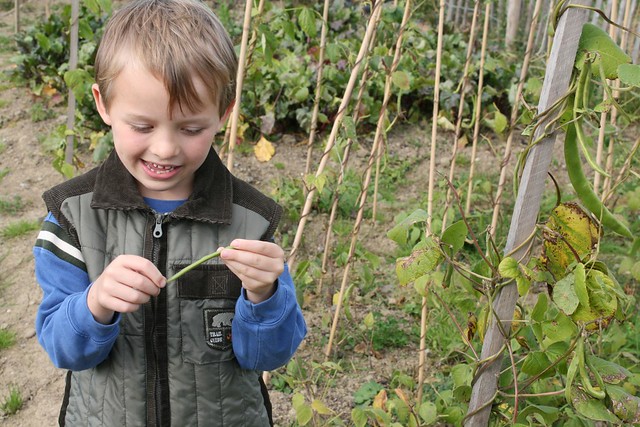
I'm a worrier. On top of worrying about money, about my kids, about school, about our car in Ireland which has spent the last 2+ years sitting in someone's front garden, about our jobs, about the girl's eczema, about my eczema, about moving, about staying... I could go on and on.
And the environment; I really worry about the environment. And when I say environment, I mean God's creation. Because that's what it is: His earth, His plants and water and animals and people... God's garden.
This worry began around 2002 when Matt worked in lawn "care" and came home with his glasses covered in yellow pesticide fuzz, steadily increased in Ireland where we planted our first real garden (Schrute Farm), and escalated to it's peak during the Great Diaper Crisis of 2009 (we calculated that by the time Ash was potty trained, we would have been diapering for 10 years, and the mere thought of another 5000 diapers wasting away for the next 500 years in beautiful Ireland was just too much to bear).

Being green in Ireland is easy, you see, for there is only so much land to give to waste and you are emotionally and financially bound to your compost and recycling bins for fear of going over your rubbish weight allotment.
Upon arriving back in America (with our cloth diapers in tow), I couldn't wait to throw away some stuff. All the stuff. Oh what freedom was to be had in just throwing any old thing away.
But... I couldn't do it. I'd hold my hand over the trash can and fret. Where will this broken plastic container end up? How long will it rot (or not rot) there? And this sock? It has no partner, no use to us, but when does synthetic fabric break down? Do I just throw. it. away?
This is why Jen Hatmaker's chapter on Waste in her recent book 7 speaks to me. Jen recognizes and calls out the hyprocrisy modern Evangelicals perpetuate: we advocate for the redemption of souls, the regeneration of hearts and lives of eternal worth, while we abuse and misappropriate the earth's resources for our temporal, costly comfort.
"My luxuries come at the expense of some of God's best handiwork: forests, petroleum, clean air, healthy ecosystems. We also ravage the lands of vulnerable countries, stripping their resources for consumption. The wealthy world has a sordid history of colonization, ruling by force over indigenous people and providing from their natural resources and local labor. Yes Africa, we'll take your diamonds, gold, and oil, but you can keep your crushing poverty and disease." p.136
Here's a (not so) cute anecdote. Earth Hour, a short investment of time on a Spring Saturday evening where anyone can turn off the lights, the TV, anything requiring an outlet or a cord. It is a worldwide event. Back here in America, as we planned to participate in an hour of semi-darkness, some good church-going people had other ideas.
"I'm going to turn every light and every appliance on during Earth Hour," an acquaintance posted on Facebook, "I want those people to see how ridiculous it is." To add insult to injury, he equated it with God's call to the church to be a shining city on a hill. Literally.
We want to save people, yet we belittle the very people and organizations who are trying to save, redeem, and breathe new life into God's creation.
So mad props to Jen Hatmaker! She starts with a bang, going from zero to 60 in one month; from not recyclying a darn thing, to composting, shopping second-hand, driving/sharing one car, and researching locally made hemp tennis shoes. It is clear that God is challenging her and growing her, both in and out of their new backyard garden. And it's challenging me, too.
I loved reading her insights and struggles, relating the split personalities that emerge when trying to make smart, economical, healthy, local, environmentally-friendly choices (I, too, spend about a half hour per shopping market aisle in a mental health death match with five other Karen Konsumers - see what I did there?).
Here's the question she poses that sticks with me:
"What does it mean to be a godly consumer? What if God's creation is more than just a commodity?"
I don't have the perfect answer to this, but only - like Jen does - can I seek to try... to try to do the right thing, to try and make wise, eternal choices. Here are some ways we are trying:
- Recycling (glass, plastic, paper, cardboard)
- Reusable shopping bags
- Shopping farmers' markets twice a month for local, organic yumminess
- Buying mostly second-hand for kids' clothes
- Attempting to grow some green things on our tiny balcony (namely: hydrangeas and basil)
- Using and reusing BPA-free water bottles (no plastic bottles in our home... except for diet coke 2 liters)
- Waste-free lunches for kids (reusable lunch boxes, snack bags and sandwich containers)
- Repurposing lumber and old furniture for new projects
Notice what's missing? Those cloth diapers. He's three now and could remove them at will... but we donated them to a friend, so really, we're still good I think.
So, we're trying. We love God, we love His people, and we love Creation. It's right there in our family purpose statement.
"I'm done spearating ecology from theology, pretending they don't originate from the same source." p. 150
Me too.
Have you read 7? What do you think it means to be a godly consumer?

